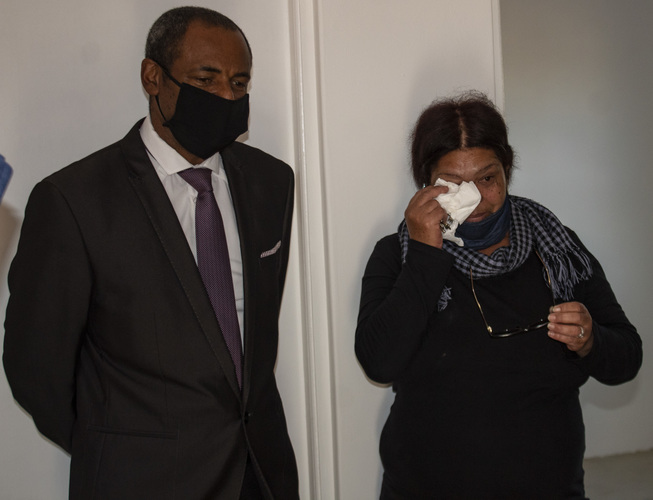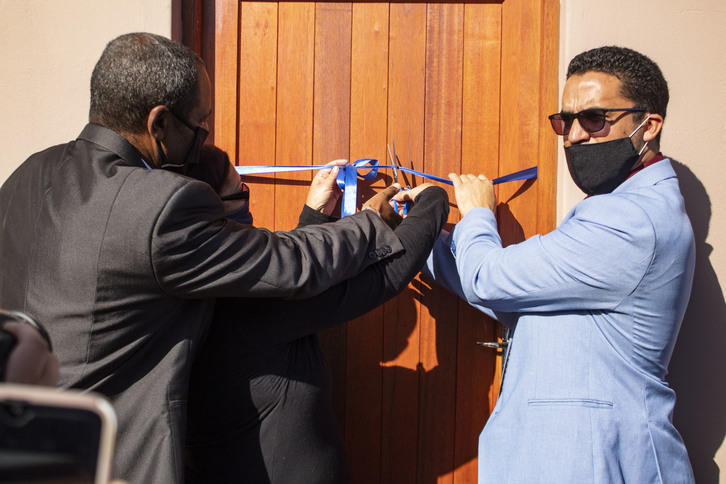Gallery
KNYSNA NEWS - On Friday last week, some longtime residents of Hornlee could breathe a bittersweet sigh of relief as they were finally handed keys to their new homes, despite not having an electricity supply.
Housing is a hot topic in Knysna and in Hornlee in particular, as for the past 12 years there have been numerous talks, negotiations, and even plans to build housing in Hornlee, with none of the plans ever materialising.
The last houses built in the area came in 2000, but there was hope when in November 2014 it was stated that 359 houses would be built Hornlee. This never materialised. In May 2017 this number was reduced to a promise of 312 houses, but again the promises amounted to nothing.
Most recently, in February 2019, it was announced that 155 RDP houses would be built in Hornlee after provincial government had allocated R20-million to Knysna.
Light at the end of the tunnel
The housing scheme continued to simmer and didn't show signs of coming to fruition, leading to protests in Hornlee, and eventually a meeting between community organisation Knysna United (formerly Hornlee United), Knysna Municipality and the Human Rights Commission in June 2019.
This was followed by a second meeting in August, and a third in October, with the latter seeming third time lucky for residents when former municipal manager Dr Sitembele Vatala announced that emergency housing had been greenlit for Hornlee, and that 155 houses were in the pipeline in a project worth more than R200-million.
Photo gallery: Housing in Hornlee given to beneficiaries
And so it came to be that on 28 October 2019, a traditional sod-turning ceremony at the main site near Hornlee Primary School provided a landmark moment as it was the furthest they had come in their pursuit for housing. With the project under way, the first 50 houses were to be handed over by the end of March this year, which also marked the start of the national Covid-19 lockdown.
Work resumes
After work was put off due to the lockdown, the project resumed under Level 4 in May. On 17 June, provincial Human Settlements Minister Tertuis Simmers visited the site and gave it a thumbs up. Just under two months later, with 42 houses completed, Simmers returned on Friday 14 August for the official handing over of the houses to beneficiaries, some of whom had already received keys to their houses prior to the official ceremony.
One issue that remained a large point of concern was that there was no connection to the electrical grid, despite the necessary wiring already being built into the houses.
"There were two options – wait for electricity to be supplied and run the risk of the wrong people illegally occupying the houses, or allow residents to move in and the installation of electricity happens as soon as possible," Simmers said, explaining that he had discussed the matter with the municipality. "People have been waiting for houses for years, and expressed a willingness to live without electricity for the time being." During the official handover ceremony, Simmers stated that work on the installation of electricity would begin "within a week".
When the municipality was asked why the electricity had not been connected first, along with the water, its spokesperson Christopher Bezuidenhoudt said, "The process was affected by substantial delays due to Covid-19."
Emotional handovers
Prior to Simmers' speech, mayor and former Ward 6 councillor Ricky van Aswegen addressed those in attendance in an emotional speech. "People have come to me, saying that they have prayed for houses for so long, and they have now changed their prayers to simply ask that they can live long enough to enjoy the house that has been given to them," Van Aswegen said.
"This has been coming since 2008. There have been numerous councillors that have fought for this project, and I am lucky to be in the position I am to witness this coming to fruition."
Simmers' speech was also tinged with emotion, as he himself grew up in Plettenberg Bay. He first explained the process of selecting beneficiaries of the houses. There are four categories of people prioritised for the housing list: people 60 years and older; persons with a disability; people who have been on the waiting list for 15+ years; and people who live in others' backyards. The overriding requirement, however, is that people have to register for the waiting list. "The days of politicians and municipal officials playing politics with houses must come to an end," Simmers warned.
 Knysna Mayor Ricky van Aswegen speaks as beneficiary Mary Barnard, who has been waiting for 24 years, wipes tears out of her eyes.
Knysna Mayor Ricky van Aswegen speaks as beneficiary Mary Barnard, who has been waiting for 24 years, wipes tears out of her eyes.
Warning to beneficiaries
He also discouraged beneficiaries from using their given houses for anything other than residential purposes. "People have rented out their houses in the past. If you rent out your house, then you did not deserve it in the first place. You may also not sell your house within the first eight years of it being signed off in your name," Simmers explained.
"The only person you can 'sell' this house to is back to me, as representative of the state, and only with good cause. If people sell their house, I WILL take them to court, because in doing so you are defrauding the government."
He had one final request of the beneficiaries before moving on to the official handing over. "Please, take pride in the house you have received. This didn't come for free, there have been countless sacrifices to get here. Take pride in your house, make it look nice, and make it home."
After the opening speeches, Simmers and Van Aswegen visited five of the longest-standing beneficiaries of the project. At each one of the houses, the beneficiary was moved to tears, one of whom was Charles Botha, who expressed his gratitude. "I cannot say what this means to me, and to these people. I am immensely grateful for the effort that has been put into getting us these houses," he said.
53-year wait is over
Another beneficiary, Johanna de Lange, who has waited for 53 years for a house, could hardly express herself. "I don't know how to say thank you enough. Now, my grandson will have something I can leave behind for him, and that means the world to me."
Following the handing over of the houses, Simmers expressed just how much it meant to him, too. "I have family in Hornlee, so I know a lot of these family names, and I know how long they've fought for housing," he said. "To see this come to actuality in my time as minister is extremely rewarding for me."
There are still eight units to be completed on the main site after contractors ran into complications, and two other housing sites for the remaining 105 units are still under construction in Hornlee.
 Knysna Mayor Ricky van Aswegen and Western Cape Human Settlements Minister Tertuis Simmers cut the ribbon at one of the houses. Photos: Blake Linder
Knysna Mayor Ricky van Aswegen and Western Cape Human Settlements Minister Tertuis Simmers cut the ribbon at one of the houses. Photos: Blake Linder
'We bring you the latest Knysna, Garden Route news'
















